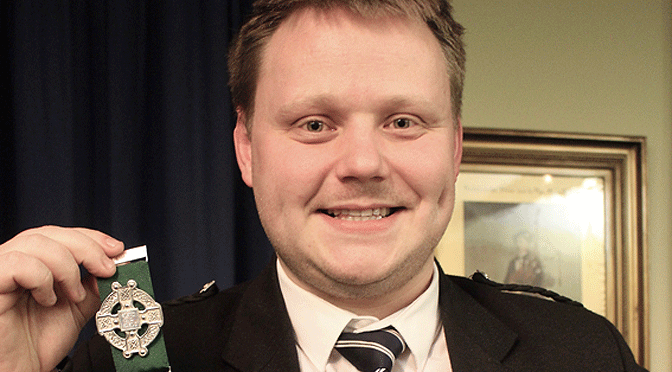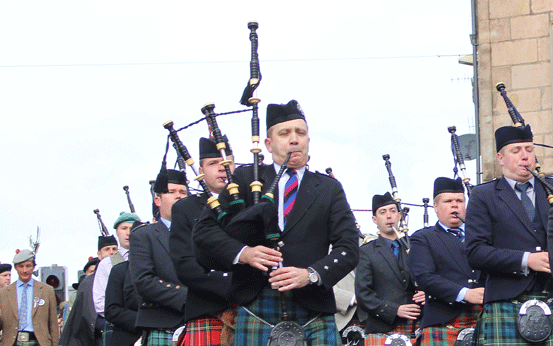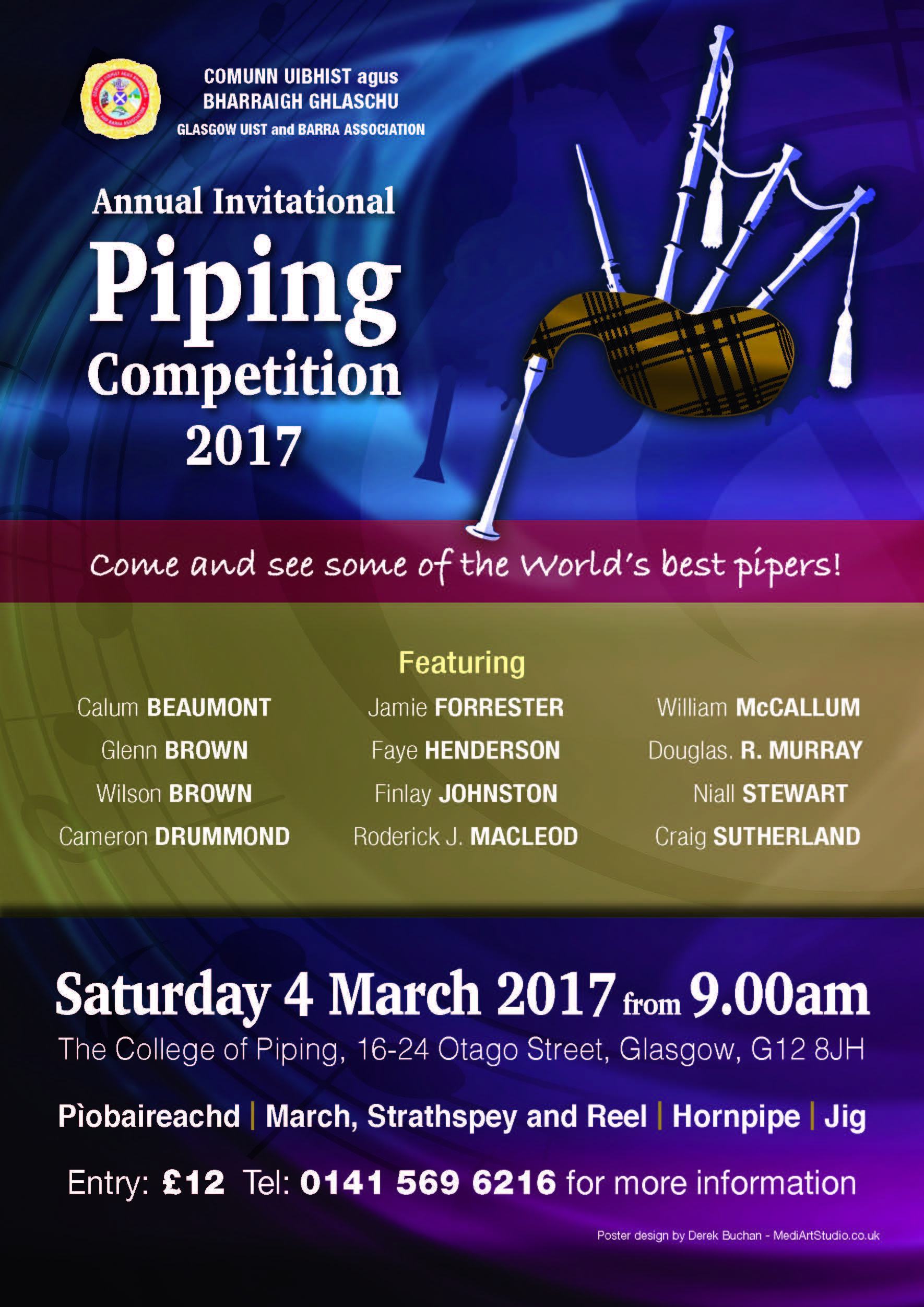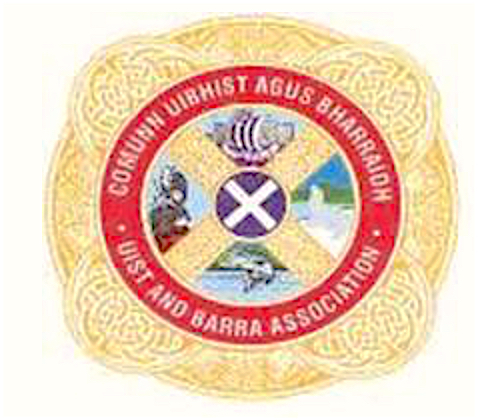Details of next week’s Uist & Barra Professional Invitational Competition have been released by Piping Convenor John Angus Smith.
Those invited to play are: Callum Beaumont, Glenn Brown, Wilson Brown, Cameron Drummond, Jamie Forrester, Faye Henderson, Finlay Johnston, Roderick MacLeod, William McCallum, Douglas Murray, Niall Stewart and Craig Sutherland
Entry is £12; venue: College of Piping; date: March 4 at 9am. Pipers will compete in ceol mor, ceol beag and port grad-charach (hornpipe) and port cruinn (jig). Order of play has been decided by ballot and will be announced next week.

The Glasgow Highland Club Silver Medal will be presented to the winner of the Ceol Mor along with the Finlay MacKenzie Challenge Trophy. John Angus Smith said: ‘We have once more some of the finest pipers in the world playing at the Uist & Barra. I am sure there will be a very high standard of play in all competitions and the lover of piping will be thoroughly entertained. We look forward to welcoming everyone to next week’s competition.’

The order of play and tune selections will be announced on Monday. Pipers will be notified of what they will play this weekend.
The Glasgow Uist and Barra Association was founded in 1888. It was established to provide support and assistance to the people who had left the islands of North Uist, Benbecula, South Uist, Eriskay and Barra. The Association promoted social and friendly relationship among the people from the islands who had left their homes to seek employment in Glasgow and beyond.
There is little written information available about the Association’s first two years but the minutes of the meeting held on the 1st May 1890 show that by this time the committee was well established. Monthly meetings were being organised and held in the Waterloo Rooms in Glasgow. Constitution and Rules were drawn up, and memberships were introduced. Annual Gatherings in the form of concerts and ceilidh dances began with up to 800 people attending. It became apparent that apart from providing financial support to those in great need, other aims and objectives needed to be considered, aims such as upholding the Gaelic language and culture in the city of Glasgow.
The Association had its successes and failures throughout the decades of the Boer War, WW1 and WW2, and it says much for the stoicism and dedication of the membership that the Association that they overcame all hardships and managed to maintaining its social life.
The Glasgow Uist and Barra Piping Competition began in 1944 at the height of WW2 and is now one of the most prestigious competition in the piping calendar. Since its inception it has been held in March, making it the first major solo event in the Scottish piping calendar.
 In 1952 the Association Crest was designed to be used on all paper work pertaining to the Association and this practice continues to the present day. The Association aspires and aims to continue the work of its forebears with ceilidh dances from October to April. An annual Reunion Dinner/Dance in November and a New Year Dance in January. This dance is well supported by the younger generation. Monthly meetings are held from September to April, and the Annual General Meeting is in May. They continue to support the Barra Lifeboat and the Glasgow Mod and are proud to have their own song composed by Roderick MacKay, Illeray, North Uist, ‘Comunn Uibhist agus Bharraigh’.
In 1952 the Association Crest was designed to be used on all paper work pertaining to the Association and this practice continues to the present day. The Association aspires and aims to continue the work of its forebears with ceilidh dances from October to April. An annual Reunion Dinner/Dance in November and a New Year Dance in January. This dance is well supported by the younger generation. Monthly meetings are held from September to April, and the Annual General Meeting is in May. They continue to support the Barra Lifeboat and the Glasgow Mod and are proud to have their own song composed by Roderick MacKay, Illeray, North Uist, ‘Comunn Uibhist agus Bharraigh’.
The Glasgow Uist and Barra Association celebrated its 125th Anniversary at a Grand Concert on Friday 22 November 2013 in the Partick Burgh Hall, Glasgow. Over 200 attended with visitors from as far as London, Thurso, Fort William, the Uists, Barra and many other places throughout the country. This is part of the ‘thank you’ speech made by Secretary Mary Bell MacDonald:
‘We must never forget the reasons why we are here. We are here because in 1888 a few brave people got together and founded the Glasgow Uist and Barra Association, so we should at this time give thanks to all those who are no longer with us, they were hard-working and strong people. 125 years ago, because of the poverty on our islands, they left their homes and their families so you can imagine the loneliness they endured. Thank them for their inspiration and great intuition, to keep our Gaelic language, our music, our dance, and our culture ongoing in the City of Glasgow we should be so proud of it all. We have to nurture it, care for it, and keep it alive for their sakes and in their memory, and for ourselves and future generations.’
















Recent Comments